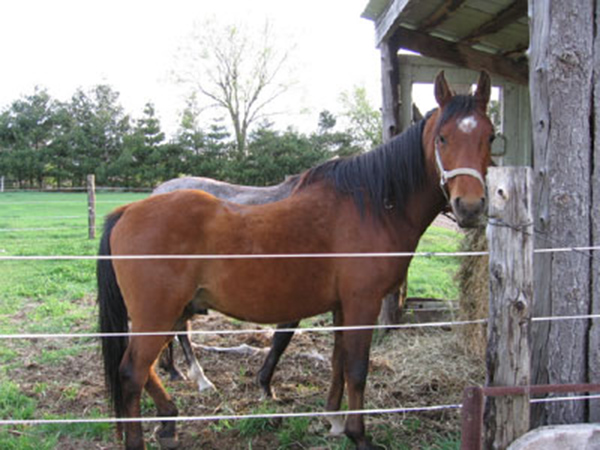Do You Know What Your Senior Horse Needs?
By: Nicole Weidner
Have an older horse? Take a minute this May to learn about the management and health of your loyal companion during their golden years with Equine Guelph’s Senior Horse Tool (www.equineguelph.ca/seniorhorsetool), developed in partnership with Boehringer Ingelheim.
There is no standard age to determine when a horse becomes a senior. Instead, factors like breed, health conditions, previous use, and history of care can all affect when your horse is considered senior. Changes that might make your horse a senior can creep up slowly over time and this makes it important to continually assess your older horses.
Equine Guelph’s Senior Horse Tool (www.equineguelph.ca/seniorhorsetool) can help you learn more about the management of senior horses and conditions that may affect them. Take the Senior Horse Challenge quiz to test your knowledge on issues related to the health and management of senior horses. Then, try out the Click and Reveal Activity and see if you can pick out which horses have Pituitary Pars Intermedia Dysfunction (PPID), a condition that can affect 15-30% of senior horses. Finally, check out the lists of additional resources that feature links to helpful videos and fact sheets on senior horse issues, like nutrition and PPID.
Most horse owners realize that every horse should be treated as an individual when developing a diet to meet their nutritional needs. However, there are four main groups that senior horses can be divided into when categorizing their needs. Check out the Senior Horse Nutrition Fact sheet (under the PDF Resources list) for more information on the category that your senior fits into:
1) The Healthy Senior
2) The Overweight/Obese Senior
3) The Senior that is Losing Condition
4) The Senior with Health Issues (the Geriatric horse)
Some of the horses that fall into the final “Senior with Health Issues” category may be affected by PPID. You can find a video of horses with PPID before and after treatment and more information on PPID under the Additional Resources list on the Senior Horse Tool (www.equineguelph.ca/seniorhorsetool).
“Every fall, Boehringer Ingelheim sponsors a PPID testing campaign in partnership with Animal Health Laboratory,” says Doug Myers, DVM, Boehringer Ingelheim Animal Health. “Over the past 5 years, more than 1,700 horses have been tested and 62% were positive for PPID.”
Have an older horse that means the world to you? Let us know by sharing this article and telling us about your horse! Let’s thank the senior horses that have spent their years making ours better by spreading the word about the Senior Horse Tool (www.equineguelph.ca/seniorhorsetool) and educating fellow horse lovers on how to give senior horses the best care possible.











